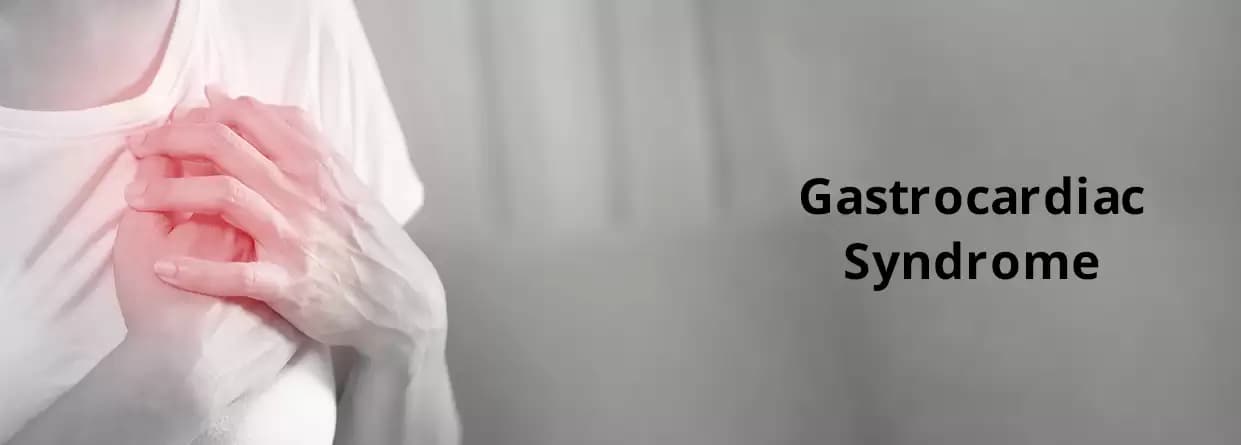
Gastrocardiac syndrome (Roemheld syndrome) is a condition where digestive issues like bloating or acid reflux can trigger heart-related symptoms such as palpitations or irregular heartbeat. Early diagnosis is crucial to distinguish it from serious cardiac conditions and ensure proper treatment.
Gastrocardiac syndrome refers to the symptoms relating to both the heart and stomach. Also known as Roemheld syndrome, the condition involves issues in the stomach which can trigger palpitations. Dr Ludwig Roemheld was one of the first researchers to explore the link between the heart and stomach. For example, an irregular or rapid heartbeat can be experienced at the same time as bloating or acid reflux.
Most people often confuse heartburn, gas, etc. with cardiac symptoms and often prolong the treatment. Therefore, it is important to distinguish gastrocardiac syndrome from other conditions for effective treatment. Let us deep dive to understand this medical condition and find out the link between the stomach and your heart. Please note that this blog is for informational purposes only. In case you are experiencing gastrocardiac syndrome symptoms, consult with the cardiologists in Kolkata for a comprehensive treatment.
You may be suffering from gastrocardiac syndrome which can lead to symptoms relating to both the heart and stomach. While most signs may be silent and not cause major discomfort, prolonging the condition can lead to signs such as -
Basically, the symptoms arise from the stomach and trigger heart rhythm. When this happens, you are looking at gastrocardiac syndrome. Not many people or doctors think about the condition because the symptom mimic other health conditions. However, a comprehensive diagnosis can ensure effective treatment and long-term health benefits.
There are several triggers for gastrocardiac syndrome which can vary from person to person. Some researchers believe the condition to be a result of chronic inflammation in the stomach. This can cause bloating and the building up of gas. A bloated stomach stimulates heart muscles while also activating the vagus nerve which can slow down the heart rate (leading to arrhythmia).
Most patients are on a regular prescription for a heart or stomach condition. Medications for the stomach can have side effects on your heart and vice versa. Most people also use proton pump inhibitors to reduce acid reflux in the stomach. However, certain side effects can cause arrhythmia.
Our heart and stomach are in close proximity to each other. The two organs are separated by a diaphragm and connected via a food pipe (oesophagus). Doctors often use a probe down the food pipe to examine the heart in detail. Therefore, any stomach-related disorder is likely to affect your heart health. This anatomical proximity of the heart and stomach often causes heart rhythm abnormalities. But how does it lead to arrhythmic heart rhythm?
Needless to say, acid reflux is incredibly common in people and is often prevalent due to our diet, weight gain, etc. People tend to rely more on proton pump inhibitors to reduce the acid in the stomach. However, certain side effects include absorbing fewer nutrients such as magnesium. Reduced magnesium is linked to ectopic or irregular heart rhythms.
Our digestive system is in close proximity to our heart. The stomach which is located just below the diaphragm and heart is connected via a food pipe. Bloating is also associated with an arrhythmic heartbeat. Frequent bloating due to a very full stomach can push against the diaphragm which can impinge on the heart. Due to the movement of the diaphragm, the position of the heart changes slightly which can trigger irregular palpitations.
While most of us are unaware of our deteriorating cardiac health due to our digestive system, it is imperative that we seek medical consultation from the best cardiologists for early treatment and avoid any major health issues in the future.
Chronic atrial and intestinal dysrhythmia (CAID) can affect the heart and digestive system. CAID disrupts the normal heart rhythm which is linked to digestive disorders.
While there is no effective cure for the condition, there are certain medications and techniques which can help you manage gastrocardiac syndrome symptoms. In case you are experiencing stomach and heart abnormalities, get in touch with a specialist for an effective treatment.
While acid reflux does not directly cause heart palpitations, it can make other symptoms like anxiety, and panic attacks, more frequent. GERD can be an indirect cause of palpitations.
Written and Verified by:

Consultant - GI & Hepato-Biliary Surgeon Exp: 26 Yr
Gastro Sciences
Dr. Ajay Mandal is a Consultant GI & Hepato-Biliary Surgeon at CMRI Hopsital, Kolkata, with over 20 years of experience. He specializes in liver, pancreatic, and colorectal cancers, performing complex surgeries including laparoscopic and robotic procedures.
Similar Gastro Sciences Blogs
Book Your Appointment TODAY
© 2024 CMRI Kolkata. All Rights Reserved.